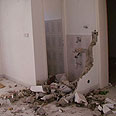
Film captures Gaza teens' trauma
'Home Game,' a new documentary, accompanies teenage group during Gush Katif's final days
The film, Home Game, directed by Yaron Shane, was filmed entirely with home video cameras, and is based on the lives of the teenagers of Netzer Hazani, a Gush Katif settlement, during its last days before the disengagement.
Sitting on the beach, driving around, or singing the notes of a love song with a guitar, the teenagers are shown enjoying the summer in typical Israeli fashion.
Yet against this background, the ominous shadow of the disengagement from Gaza and the uprooting of Israeli communities looms, constantly undermining any feeling of normalcy.
Final game
On the day all Israeli civilians were ordered to leave Gush Katif, August 15, high school students from Netzer Hazani held their final basketball game, which would decide the tournament.
"Apparently someone above intended it to be that way," a Gush Katif resident in the movie said.
"There are still many people who won't allow themselves to feel sympathy for the families of Gush Katif," Avi Abelow, the film's producer, said before the screening. He added that the film's aim was to "put aside political views, and to start to understand who these people are."
Human side
Home Game succeeds in accomplishing that goal, as the teenagers on the screen shatter any preconceived notions of settlers, and charm their way into the viewers' hearts. It is difficult not to empathize with their suffering, as their faces and dynamic personalities suddenly demolish stereotypes, and beg the question of why so much media coverage during the disengagement failed to depict the human side of this story.
Following scenes of childhood friends meeting with one another, arguing, playing basketball, and maturing faster than normal due to the events surrounding them, the film manages to transmit the sense of shock felt by the teenagers as they realize that they must really leave their homes, and that the communities they have known their entire lives will be demolished.
As tensions grow, the film focuses on Netzer Hazani's basketball team, and the growing sense of unease. By the time the team plays its final game, Gush Katif is already on its way out of physical existence, and the sense of astonishment left behind after the credits roll marks a success for the filmmakers.
'This hasn't passed'
Speaking to Ynetnews, Elidad Shnaid, a central figure in the film, described the feeling he had of watching himself on the screen a year later.
"The atmosphere is still difficult. This isn't something that has passed. In terms of my outlook, I feel a little more moderate, because I tried to find some sort of process, some sort of idea behind these things. During the evacuation, the feelings were mixed; you don't really know what you're thinking. Afterwards, you're more thoughtful."
Einat Yefet, who filmed some of the movie's scenes, said: "Now that I look at the film, the first thing I feel is longing. There will never be a better place in the world. Beyond the fact that the houses were destroyed, you deal with other difficult things.
"People are scattered, you can't help them, and you don't know what's going on with them. I rarely see my best friends who I grew up with. Those who haven't experienced it will never understand it. I view what we underwent as a form of group rape, because that's what happened. We were forced to leave."










